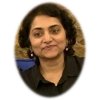Home / Training / Manuals / Atlas of breast cancer early detection / Acknowledgement
 Click to return to the atlas
Click to return to the atlas
Atlas of breast cancer early detection
Filter by language: English / РусскийLearn more about the authors
 | Dr Anita Gadgil Professor Anita Gadgil is head of the Department of Surgery and the WHO Collaborating Centre for Research on Surgical Care Delivery in low- and middle-income countries at Bhabha Atomic Research Centre (BARC) Hospital, Mumbai, India. She completed her master’s degree in general surgery (MS, Gen Surg) from KEM Hospital, Mumbai, India, in 1994 and has been consultant and teaching faculty at BARC Hospital since then. She has 20 years of experience in surgery and treatment of breast cancer. She has been working in the field of early detection and screening of breast cancer and breast cancer affordable care for 10 years. After completing training in cancer epidemiology at IARC in 2011 and 2015, she has been conducting various population-based programmes for the early detection of breast cancer. She has experience of working at the policy and programme level with the ministries of health in India, Bangladesh, and Nepal. She also has community work experience in implementing early detection programmes in urban communities in Mumbai and in rural communities in Assam. She has also produced many publications on breast cancer. She was awarded a Future Cancer Leader Fellowship by IARC in 2016. She is currently involved in surgery and cancer care in limited-resource settings and global surgery as part of the WHO Collaborating Centre. |
 | Dr Surita Kantharia Dr Surita Kantharia is senior consultant radiologist in the Department of Radio-diagnosis, Bhabha Atomic Research Centre (BARC) Hospital, a multi-speciality hospital in Mumbai, India. Dr Surita trained in radio-diagnosis at Lokmanya Tilak Memorial Medical College, Mumbai, and completed her post-graduate studies in 1997. She is a specialist in multimodality imaging, including conventional radiology, ultrasound, and cross-sectional imaging. She has a special interest in imaging in women, and she developed the section on breast imaging, including mammography, breast ultrasound, and image-guided breast interventions, at BARC Hospital. She trained in breast imaging at St Luke’s Episcopal Hospital, Texas, USA, in 2010 and at Tang Tock Seng Hospital, Singapore, in 2013. She is a member of the awareness-based early breast cancer detection programme conducted at BARC Hospital and is involved in the outreach programme for the community. Her work is focused on early detection of breast cancer, and she has developed skills in the detection of preclinical breast cancer. She also has a keen interest in benign breast conditions and has a large database of non-malignant breast diseases. She has published and has received awards for her work in the detection of early breast cancer. |
 | Dr Susan Cherian Dr Susan Cherian is head of the pathology department at Bhabha Atomic Research Centre (BARC) Hospital, a multi-speciality hospital in Mumbai, India. Dr Cherian obtained her MD in pathology in 1992 from Lokmanya Tilak Memorial Medical College in Mumbai. Thereafter, she joined BARC Hospital, where she developed the cytopathology and histopathology sections and started immunohistochemistry for breast biomarkers. She also trained in surgical pathology as an International observer at the Cleveland Clinic, Ohio, USA, in 2003. Since 2007, she has been a teacher in the postgraduate programme in pathology under the Diplomate of the National Board of Examinations (DNB), New Delhi. She has a special interest in breast pathology and, as a guide to DNB trainees, has undertaken research projects in breast fine-needle aspiration cytology and breast cancer histopathology for their dissertations. She has authored over 20 research publications. Previously she was also the member-secretary of the Medical Ethics Committee and DNB coordinator of the hospital. Dr Cherian is also involved in conducting a course on cancer biology at the Homi Bhabha National Institute. She was awarded the Department of Atomic Energy Scientific and Technical Excellence Award 2014 in the area of medical care and ethics. |
 | Dr Partha Basu Dr Partha Basu is the Head of the Early Detection, Prevention, and Infections Branch at IARC. After graduating in Medicine in 1988, he obtained an MD in Obstetrics and Gynecology, postdoctoral training in Gynecological Oncology, and a PhD in Clinical Oncology. Before joining IARC in 2015, he was head of the Department of Gynecological Oncology at the National Cancer Institute in India. Dr Basu is well known for his research that has informed several guidelines and recommendations from WHO in saving women’s lives from cervical cancer and breast cancer. His research has been instrumental to recent events that will promote equity in preventing cervical cancer, such as WHO concluding that a single dose of human papillomavirus (HPV) vaccine delivers solid protection, authorities recommending marketing authorization for a new low-cost HPV vaccine in India, and WHO recommending a simple and affordable technology (thermal ablation) for the treatment of cervical precancers. Evidence generated from his study on the long-term impact of triennial screening for breast cancer with clinical breast examination (CBE) will be very valuable for the WHO Global Breast Cancer Initiative. Dr Basu has been supporting countries across the globe to implement cervical and breast cancer screening programmes with equity and quality through the Cancer Screening in Five Continents (CanScreen5) project. He is leading implementation research projects aimed at improving cervical cancer screening in vulnerable women in three countries in Europe and in India. He has significantly contributed to build capacity in delivering quality-assured cervical and breast cancer early detection services in several low- and middle-income countries. |
Technical Consultant
 | Mr Eric Lucas Mr Eric Lucas is a Health Information Systems Specialist who joined the Screening Unit at IARC in 1999. His work includes designing health information systems and monitoring field studies, pilot projects, and national programmes, specifically in low- and middle-income countries. Mr Lucas is involved in the development of digital teaching materials (e.g. image atlases and digital tutorials). He was previously involved in cancer registration at IARC in the Unit of Descriptive Epidemiology. He has served as a consultant to WHO, the United Nations Population Fund, the European Union, Program for appropriate technology in health (PATH), and Johns Hopkins Program for International Education in Gynecology (JHPIEGO) in various African, Asian, South American, and European countries to help them to implement and monitor cancer prevention and early detection activities. |



